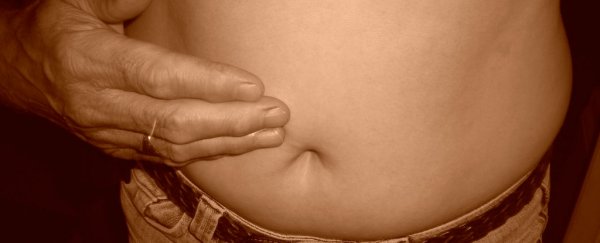The diversity of bacterial colonies inside your gut could be directly linked to the level of fat around your body, a new study has found.
The current study is the largest yet to compare microbial diversity against levels of fat in the body, and found evidence that a person's obesity risk could be influenced by the gut bacteria we inherit from our parents.
Researchers from King's College London in the UK analysed faecal microbes from the stool samples of 1,313 individuals, and compared this to six measures of obesity, including body mass index (BMI), and upper-to-lower body fat ratios.
A statistical analysis mapping fat markers against faecal bacteria showed the strongest links between microbial diversity and levels of visceral fat (the fat that collects around the abdominal region). In other words, the less diverse the bacteria, the more fat present, and vice versa.
The numbers also showed visceral fat levels to be "highly heritable" in an extended sample of 3,666 twins, even after adjusting for BMI.
"This study has shown a clear link between bacterial diversity in faeces and markers of obesity and cardiovascular risk, particularly for visceral fat," said lead researcher Michelle Beaumont.
We should note the scientists haven't determined any kind of causation here, but with excessive visceral fat levels closely linked to heart problems and other metabolic diseases, anything we can do to reduce it could help.
As we learn more about our internal microbiomes, we're starting to understand more about its role in our health and how important maintaining a diverse microbiome could be to processing food and fighting off disease.
Previous research has found our microbiome seems to contribute to chronic fatigue syndrome, depression and anxiety, and stroke risk.
In the long term, researcher hope to be able to improve people's health by treating the microbiome directly. Previous studies have shown how faecal transplants in mice can effectively 'reprogram' bacterial colonies in the stomach and eliminate certain superbugs along the way.
There's so much potential here, that researchers are now testing the technique out on humans through freeze-dried tablets of poop designed to encourage a healthy microbiome.
But in terms of this study and the link between gut bacteria and belly fat, the researchers acknowledge it's still early days.
"Further scientific investigation is needed to understand how precisely our gut microbes can influence human health," said one of the team, Jordana Bell, "and if interventions such as faecal transplants can have safe, beneficial, and effective impacts on this process."
The findings have been published in Genome Biology.
